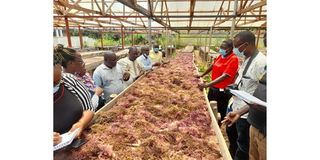Boost for blue economy as researchers expand seaweed farming to Tharaka Nithi

A group of members of Tharaka Nithi County Assembly during a visit at the Kibuyuni Seaweed Farmers centre for a benchmarking in Kwale County. KMFRI plans to open a research centre in Tharaka Nithi to expand cultivation of the seaweed and other aquaculture activities in the county
Marine researchers are working to introduce seaweed farming in Tharaka Nithi County.
This is part of efforts to harness the blue economy while helping socio-economic development in communities.
The weed has a variety of uses and can fetch good returns. It can be used as fish feeds and can be processed to generate thickeners in the pharmaceutical, cosmetic and food industries. It can also be used as a soil conditioner and fertiliser.
Gladys Mwaka, a mariculture research scientist at the Kenya Marine and Fisheries Research Institute (KMFRI), said the seaweed farming study will be part of activities at a new research centre being set up in Mutonga.
The centre, to be established on 10 acres provided by the county government, will concentrate on water bodies and the rearing of fish.
“We are planning to open a branch in Tharaka Nithi County. This will benefit most communities in the Mt Kenya region because Mutonga is a strategic location giving access to water resources,” Ms Mwaka said.

Fatuma Mohammed, seaweed farmer and the Chairperson of Kibuyuni Seaweed Farmer's Cooperative out harvested seas weeds that are set for drying in Kwale County. Kenya Marine and Fisheries Research Institute (KMFRI) plans to extend the cultivation to Tharaka Nithi County and boost the blue economy.
“They will get the benefits that partner communities in the Coast region are getting from KMFRI.”
She added that the core reason for the study will also be to see if the features of the Indian Ocean can be adapted in the county, including a change of salinity levels in water resources to support the growth of seaweed.
She was speaking during a tour by Tharaka Nithi officials in Kibuyuni, Kwale, where the community has been growing seaweed after successful research by KMFRI.
Another project set to be implemented in Tharaka Nithi is fish rearing in cages.
Nora Mangangi, a technical operator at the Kibuyuni seaweed farm, said the project had helped the community in the area and could do the same in Tharaka Nithi.
“We only did the research for two years and then implemented it. It is clear that this has had a great impact in the village here,” she said.
Ms Mangangi added that the project has empowered many women, who have earned from seaweed farming by selling the product locally and internationally.
“One farmer gets at least one tonne in one and a half months. Our 200 farmers have collected at least 250 tonnes. The weed is sold as raw material when dry, but they also do value addition, such as making lotions, jelly, soap and food,” she said.
Fatuma Mohammed, the chairperson of the Sea Weed Cooperative in Kibuyuni, said more than 200 farmers had benefited from the weed, which takes only 45 days to mature.
“This has helped us economically because we can now afford healthcare and take our children to school. More women, who are a majority of the farmers, have also benefited from the project,” she explained.
Tharaka Nithi County Assembly Deputy Speaker John Njagi, who is also the chair of the Agriculture, Livestock and Fisheries Committee, said an aquaculture research and training centre will be set up in his county and they wanted to understand how his community will benefit from it.
“There are water resources in our areas and it will be of great benefit if we harness it for the living standards of our people to be uplifted,” he said.
The Kibuyuni Seaweed Farm was the first in Kenya when it was established over a decade ago.





